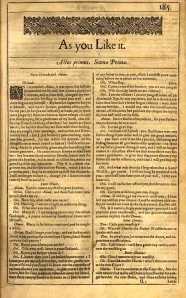
Registered in 1600 but not printed until 1623 somehow proves that Shakespeare just wasn’t himself in those days.
On this day in theatre history–August 4, 1600–three plays by William Shakespeare (Much Ago About Nothing, Henry V and As You Like It, and one by Ben Jonson (Every Man in His Humour) were officially entered into the Stationers’ Registry. What did this mean? Not a whole lot, actually. Though it does give us some sense of when these works were written. Shakespeare’s plays had been registered before and the authority of the registry was limited. In essence, the Stationers’ Registry was a way for London printers–members of the Stationers’ guild–to declare their right to publish certain works in the days before actual copyright laws existed. It’s not as if Shakespeare and Jonson walked into the offices of the Stationers’ Company with their scripts in hand hoping to register them in order to protect their intellectual property. And in this particular instance all four plays were “stayed”–meaning that they were specifically noted in the registry as works not to be printed. But the stay didn’t hold for long–within a few years three of the four were published. Only one held out–As You Like It didn’t appear in print until the famed First Folio edition of 1623. The purpose and meaning of the “stayed plays” has been a source of scholarly debate for years–no one seemingly able to make much sense of why these plays were so designated and not others.

A turnip by any other name? “Alas, I’d rather be set quick i’ the earth/and boul’d to death with Turnips.”
Of course, self-published members of the tin foil Elizabethan cap brigade (those who claim that Shakespeare was just about anyone else but Shakespeare) have jumped on this confusion to contort the evidence in ways to show that this is absolute proof that Shakespeare didn’t write his own plays. Somehow they argue that the prohibition of printing these works could only be obtained through permission of the author and that the only person who could authorize such things was the Lord Chamberlain and that therefore the Lord Chamberlain (whom they maintain was the Earl of Oxford), and not Shakespeare, was Shakespeare. It’s all rubbish, of course. (But then again, according to the Oxfordians, I’m obviously a co-conspirator in the massive international plot by academics to suppress the truth that Shakespeare was really not himself in order to protect our “turf” and save our jobs from elimination–not realizing that if some academic actually found irrefutable proof that Shakespeare was really someone else, he or she would be sprinting full out to the nearest academic press to get the information in print before anyone else did and that our jobs are not based on whether Shakespeare was in fact Shakespeare or the Earl of Oxford or merely a very clever turnip.)

Pingback: “The fool doth think he is wise, but the wise man knows himself to be a fool”*… | (Roughly) Daily